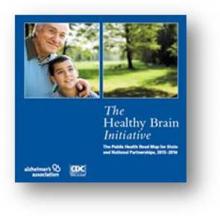September is Healthy Aging Month and we are highlighting several important issues for senior health. We wanted to share a national initiative for cognitive health.
The Healthy Brain Initiative by the Centers for Disease Control
“Productivity, independence, and quality of life for millions of Americans depend on the nation’s collective ability to prevent and treat cognitive impairment and dementia, and to promote cognitive functioning for individuals living in our communities. To accelerate efforts to meet these goals and help incorporate cognitive health in the plans and initiatives of states, territories, and communities in the U.S., we look forward to working with our partners to implement the actions identified in The Healthy Brain Initiative: The Public Health Road Map for State and National Partnerships, 2013–2018.”
by Lynda A. Anderson, PhD, and Robert Egge Co-chairs of Leadership Committee
The growing burden on individuals, families and communities has moved Alzheimer’s disease, once considered a rare disorder, to a recognized major public health problem that severely impacts older adults and their families. To more fully understand its implications, the Centers for Disease Control and Prevention (CDC) established the Alzheimer’s-specific segment of CDC’s Healthy Aging Program, referred to as The Healthy Brain Initiative, in 2005. Together with the Alzheimer’s Association, National Institute on Aging, Administration on Aging, AARP, and other public and private sector organizations, CDC began to examine the current state of knowledge regarding the promotion and protection of cognitive health, to identify important gaps, and to define the unique role and contributions of public health.
The Healthy Brain Initiative is a multifaceted approach to cognitive health. The full report is here. Although the report is long and technical, the significant take-away is the importance of cognitive functioning to the health and well-being of our seniors. Public health agencies are working every day to study it and create strategies for our communities to implement.
What is Cognitive Health?
Cognition is a combination of mental processes that includes the ability to learn new things, intuition, judgment, language, and remembering. When cognition is impaired (referred to as cognitive impairment), a person has trouble with these processes that begins to affect the things he or she can do in everyday life. People of all ages can experience cognitive impairment, which can range from mild to severe. Cognitive impairment is not caused by any one disease or condition. Alzheimer’s Disease and other dementias and conditions such as stroke and traumatic brain injury can cause cognitive impairment. Some causes of cognitive impairment are related to treatable health issues (e.g., medication side effects, vitamin B12 deficiency, and depression).
Why is Cognitive Health Important?
The lack of cognitive health as seen in mild mental decline and dementia can have a profound impact on an individual’s health and well-being. Older adults and others experiencing cognitive decline may be unable to care for themselves or complete activities of daily living, such as meal preparation and money management. They may also have trouble managing medications and existing medical conditions. If cognitive decline can be prevented or better treated, lives of many older adults can be improved.
Resources
There are many resources from the National Institute on Aging, the Centers for Disease Control, National Council on Aging, and ElderCare. Click here for a list of key brain health facts.
If a loved one is experiencing cogntive impairment that may impact end of life planning, please contact us at Miller Elder Law Firm. We have helped hundreds of clients handle the consequences of cognitive decline from a legal perspective.
How The Miller Elder Law Firm Can Help
Allow our experience in the field to work on your behalf. Contact The Miller Elder Law Firm today for an initial consultation at (352) 379-1900 or fill out our convenient contact form.

